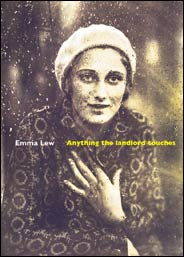 Anything the Landlord Touches by Emma Lew
Anything the Landlord Touches by Emma Lew
Giramondo, 2002
Love Trash by Ashlley Morgan-Shae
Five Islands Press, 2002
Emma Lew's second verse collection, Anything the Landlord Touches, begins with one of those stanzas that could almost serve as a credo for an entire generation of atomized humanity:
They speak of stridency and nothingness
and wrap up their shoulders in grey light.
I want to walk again in this miry place.
I want the fever and fret beneath, though
it's something I forget, like pain.
It is one of those moments that remind the jaded likes of yours truly why we're in this business. It should (if there were a shred of justice in this world) entice a wider audience to overcome their fear of the big P and take the leap to a richer fuller life.
Unfortunately, Emma Lew is nothing if not brilliantly inconsistent and, I'm afraid, should the general public reach for this book as a touchstone to the wider world of language and spirit, the world would generally be the poorer for it.
I say this, not because I think Emma Lew is a bad poet. On the contrary, she is a very good poet in her way. But maybe it's her way that bothers me. In these uncertain times, Jo Public seeks clarity, not the moral and temporal kaleidoscope of a poem such as this:
Sometimes my teacher
changes her conduct strangely,
pressing her heart
like dead leaves.
She sleeps in the chapel,
which is haunted.
Already the shadows
write in her diary.She burns the letters
silently, reverently.
Like a bride,
she pushes away her plate.
She reads to me
like a will-o'-the-wisp
and I ask her
if there are bitter drops
in everyone's cup.She says, 'I respond
to the ploughing
of the fields
whereas a man
grows fainter by a love.'
All the things
we talk about
I sew into the seams.
She opens the window
and lets in the dark flowers.('Rose Constructions')
A truly beautiful poem — to the ear at least, if not the mind. But at its heart lies a terrible emptiness, what the blurb describes as 'dramatic intensity', but which strikes this reviewer on his tenth or so reading as simply lack of anything significant to say. About this or any other time. About this or any other species of hero or god. A bit like a David Lynch film, really. This is the minefield magic realism stumbled into twenty years ago.
Ivor Indyk is a great advocate of this approach to literature, and has supported Emma Lew since the founding of his excellent magazine HEAT way back in the mid-1990s. Now, through his enterprise Giramondo, he has put his money where his mouth is. It is a European sensibility, more accurately an East European sensibility, steeped in allegory and a kind of moral autism, borne of decades of war and tyranny and the gradual disemboweling of the written word in the cause of a succession of 'isms'. It is the tradition perhaps closest to this reviewer's heart, and, in the hands of masters such as Zibigniew Herbert with his delicious bent for wry allegory, is the nearest the 20th century has come to some form of redemption. Unfortunately, Emma Lew borrowed the clothing and not the walk. Poetry that spells it out, of course, is not worthy of the name, but ultimately, a poem is obliged to make some comment, however oblique, on the world as the poet found it when she decided to put pen to paper. Otherwise, all we're left with is the question, why did you put pen to paper?
As Emma Lew's book goes on, I found myself asking this question with ever-increasing intensity, until, by book's end, I had reached my wit's end:
Decaying thunder,
all the ordinary rain.
A raft of tiny fools,
a poem of nails.('Poem')
And it was only then it occurred to me what this collection lacks, something that the East Europeans possess in bucket loads — a sense of humour. For all her sweet caressing of the ear, Emma Lew's poetry lacks a nimbleness that only a sense of humour can lend to a poem. She knows her stuff, all right. Maybe she just needs to live it.
Love Trash by Ashlley Morgan-Shae, on the other hand, is just that: trash. Five Islands Press, that sanguine mentor of mediocrity, has done it again. The blurb writers have at least spared us the word 'hip', but that's about all. Ian Syson (who's about as hip as raisin toast) hails her as 'the Courtney Love of Australian poetry', which makes me wonder if he's ever listened to Hole, or made the connection between Courtney Love and the death of grunge (the very movement for which she's eponymous). Tragically, this is where Ashlley Morgan-Shae's sensibilities are stuck fast — around 1995, when you could still say rock 'n' roll without smirking. Her book only reiterates my absolute fear and loathing of performance poetry. If you love the limelight so much, guys, grow up and become an actor, or move into spoken word where the real challenge (and money) is. But for pity's sake, don't buy yourself a guitar.














